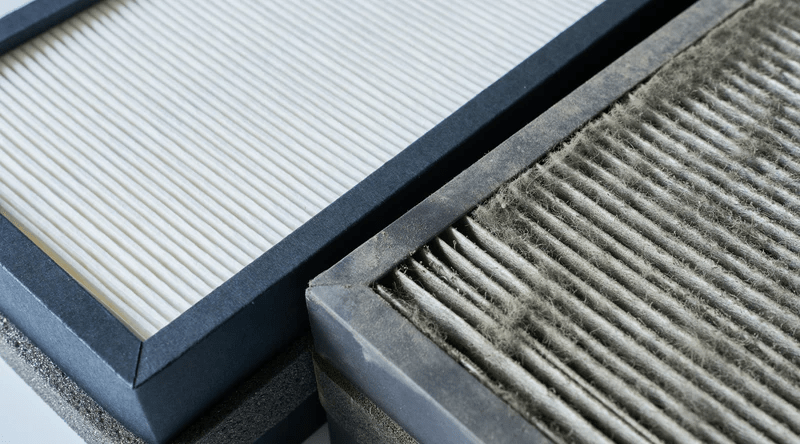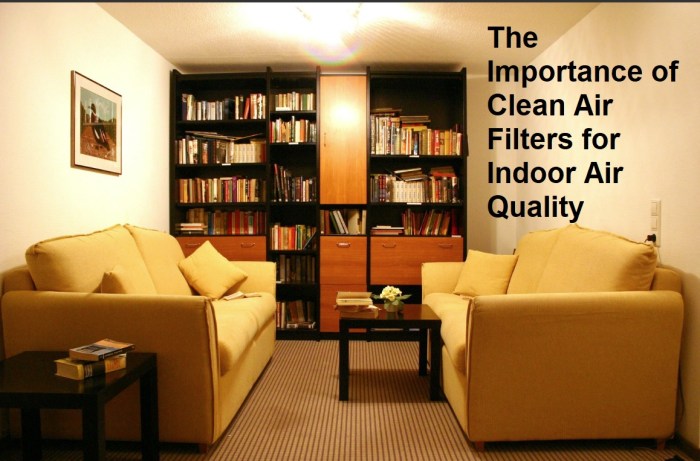Delving into the realm of air conditioner filters and their influence on indoor air quality sets the stage for an enlightening journey. From exploring the different types of filters to understanding their pivotal role in maintaining a healthy environment, this topic promises to unravel intriguing insights.
As we navigate through the intricacies of air conditioner filters, a world of possibilities opens up, shedding light on the nuances that shape our indoor air quality.
Introduction to Air Conditioner Filters
Air conditioner filters play a crucial role in maintaining indoor air quality by trapping dust, pollen, pet dander, and other airborne particles. They help in keeping the air clean and free from allergens, improving the overall health and comfort of occupants.
Different Types of Air Conditioner Filters
- Fiberglass Filters: These are the most basic and affordable filters, suitable for capturing larger particles but less effective against smaller allergens.
- Pleated Filters: These filters have more surface area for trapping particles, making them more efficient at capturing dust and allergens.
- HEPA Filters: High-Efficiency Particulate Air (HEPA) filters are the most efficient at trapping small particles, including bacteria and viruses, providing the highest level of air quality.
Importance of Regular Maintenance and Replacement
Regular maintenance and replacement of air conditioner filters are essential to ensure optimal performance and air quality. Clogged or dirty filters can restrict airflow, leading to reduced efficiency and potentially causing the system to work harder, increasing energy consumption.
Types of Air Conditioner Filters

When it comes to air conditioner filters, there are several types available on the market, each with its own set of features and benefits.
HEPA Filters vs. Fiberglass Filters
HEPA (High Efficiency Particulate Air) filters are known for their superior efficiency in capturing small particles and allergens compared to fiberglass filters. While fiberglass filters are more affordable, they are less effective at trapping tiny particles, making HEPA filters a better choice for those with allergies or respiratory issues.
Benefits of Electrostatic Filters
Electrostatic filters utilize an electric charge to attract and trap particles, making them more efficient than standard filters. These filters can capture smaller particles and are reusable, saving you money in the long run. Additionally, electrostatic filters can help improve indoor air quality by removing more contaminants from the air.
Features of Washable Filters
Washable filters are designed to be cleaned and reused multiple times, reducing the need for frequent filter replacements. While they may have a higher upfront cost, washable filters can save you money over time as you won't need to constantly purchase new filters.
They are also more environmentally friendly, as they produce less waste compared to disposable filters.
Factors Affecting Indoor Air Quality

Indoor air quality is crucial for maintaining a healthy living environment. Air conditioner filters play a significant role in improving indoor air quality by removing various pollutants and allergens from the air.
Common Indoor Air Pollutants
- Dust: Air conditioner filters can effectively trap dust particles, preventing them from circulating in the indoor air.
- Pet Dander: Filters help reduce pet dander in the air, which can trigger allergic reactions in sensitive individuals.
- Pollen: Filters can capture pollen particles, minimizing the impact of seasonal allergies on indoor air quality.
- Mold Spores: Air conditioner filters can help remove mold spores, reducing the risk of respiratory issues and allergic reactions.
Reducing Allergens in the Air
- Air conditioner filters are designed to capture allergens such as pollen, pet dander, and dust mites, preventing them from circulating in the indoor air.
- By reducing allergens in the air, filters can help alleviate allergy symptoms and improve the overall indoor air quality for occupants.
- Regularly replacing or cleaning air conditioner filters is essential to ensure their effectiveness in trapping allergens and maintaining good indoor air quality.
Trapping Dust, Pet Dander, and Other Particles
- Air conditioner filters act as a barrier, trapping dust, pet dander, and other airborne particles that can degrade indoor air quality.
- By capturing these particles, filters prevent them from recirculating in the air, reducing the risk of respiratory issues and allergic reactions.
- Choosing high-quality air conditioner filters and following a regular maintenance schedule can significantly improve indoor air quality by effectively trapping and removing harmful particles.
Importance of Proper Installation and Sizing
Proper installation and sizing of air conditioner filters are crucial for maintaining good indoor air quality and maximizing the efficiency of the HVAC system.
Selecting the Right Size Air Conditioner Filter
Choosing the correct size air conditioner filter is essential for optimal performance. Filters that are too small may not effectively capture particles, while filters that are too large can restrict airflow.
- Refer to the manufacturer's guidelines or consult with an HVAC professional to determine the appropriate filter size for your specific HVAC system.
- Measure the dimensions of the filter slot or existing filter to ensure a proper fit.
- Do not attempt to force a filter that is too big into the slot, as this can lead to gaps where air can bypass the filter.
Significance of Proper Installation
Proper installation of air conditioner filters is essential to ensure maximum efficiency and effectiveness in removing contaminants from the air.
- Follow the instructions provided by the manufacturer for installing the filter correctly.
- Make sure the filter is facing the correct direction, with the airflow arrows pointing towards the blower motor.
- Ensure that the filter is securely in place to prevent air leakage around the edges.
Impact of Improper Sizing or Installation
Improper sizing or installation of air conditioner filters can have a significant impact on the overall air quality in a space.
- An undersized filter may allow particles to pass through, reducing the effectiveness of filtration and leading to poor indoor air quality.
- An oversized filter can restrict airflow, causing the HVAC system to work harder and potentially leading to decreased efficiency and increased energy consumption.
- Filters that are not properly installed may allow air to bypass the filter, reducing filtration efficiency and allowing contaminants to circulate freely in the air.
Closing Notes
In essence, the discussion on air conditioner filters and their impact on indoor air quality encapsulates the essence of creating a conducive environment. By grasping the significance of proper maintenance and installation, one can pave the way for a breathable and wholesome indoor atmosphere.
FAQ Insights
How often should air conditioner filters be replaced?
Air conditioner filters should typically be replaced every 1 to 3 months, depending on usage and the filter type.
Do air conditioner filters eliminate all indoor air pollutants?
While air conditioner filters can help remove common pollutants, they may not capture all types. Additional air purifiers can complement filtration efforts.
Can washable filters replace disposable ones permanently?
Washable filters offer long-term cost savings, but they should still be replaced eventually to maintain optimal efficiency.











